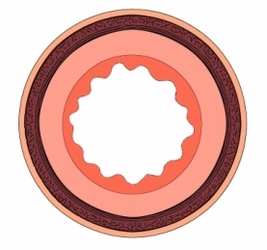Celiac disease – Celiac disease
Description of celiac disease
Celiac disease – autoimmune disease of the gastrointestinal tract. With celiac disease the consumption of food with gluten (gluten) damages the villi in the small intestine. The villi absorb nutrients substances from food. The disease affects the absorption of nutrients, therefore, patients with celiac disease often suffer from malnutrition.

Causes of celiac disease
Currently the causes of celiac disease are not fully understood. On the occurrence of the disease affects food intake, containing gluten. Also genetic factors play a role (the presence of certain types of genes). There is some evidence, that early exposure to gluten (childhood) It could lead to more severe celiac.
Risk factors for celiac disease
Factors, which may cause celiac, They include:
- The presence of family members with celiac disease;
- The presence of another autoimmune disease:
- Diabetes 1 type;
- Autoimmune thyroid disease;
- Lupus;
- Dermatitis herpetiformis – skin condition, associated with celiac disease;
- Rheumatoid arthritis.
Symptoms of celiac disease
Symptoms vary and may start in childhood or adulthood. Children often have other symptoms, than adult patients. Symptoms may not appear, If damaged a small part of the intestine. Often the first sign of celiac disease may be malnutrition, subsequently arise more severe symptoms.
Signs and symptoms of celiac disease may include:
Children
- Abdominal pain;
- Nausea, anorexia;
- Vomiting – in the later stages of the disease;
- Diarrhea;
- A chair with a strong odor;
- Irritability;
- Low growth;
- Delayed puberty;
- Pale skin;
- Convulsions;
- Lopa sores at the corners of the mouth;
- Shallow mouth ulcers.
In adults,
- Abdominal distention;
- Gas;
- Diarrhea;
- Fetid, bright, oily stool;
- Weight loss;
- Poor appetite;
- Fatigue;
- Abdominal pain;
- Pain in the bones;
- Changes in behavior;
- Muscle cramps and joint pain;
- Convulsions;
- Dizziness;
- Skin rash;
- Dental problems;
- Missed menstruation;
- Infertility;
- Changes in sensations in the limbs.
Diagnosis of celiac disease
The doctor will ask about your symptoms and medical history, and perform a physical examination. Symptoms of celiac disease can be similar to the symptoms of other diseases. The diagnosis can take a lot of time. Early diagnosis and treatment of celiac disease reduces the risk of complications.
Tests may include:
- Liquids and waste the body must be checked for the presence of malabsorption. For this purpose,:
- Blood tests;
- Fecal;
- Maybe, it will be necessary to select a sample of tissue for further testing. This can be done with Biopsy;
- With endoscopy examination can be performed intestine.
Treatment for celiac disease
Lifetime, gluten-free diet is the only treatment for celiac disease. It is very effective. Symptoms of celiac disease usually disappear within a few days after the start of the diet. Nonetheless, recovery of the villi may take months or years. The consumption of gluten can damage the intestine, even if you have no symptoms. Delayed growth and tooth discoloration may be permanent. It may be necessary to take nutritional supplements, including intravenous Chaste, especially if you do not heal intestinal damage. Gluten is added to many food products, Maintaining a diet can be quite complex.
Changes in diet in celiac disease
You should avoid foods, containing:
- Wheat;
- Rye;
- Barley.
This includes most types of bread, pasta, cereals and processed foods. Now available are special types of bread and pasta without gluten. They are produced using the Potato, rice, soy or bean flour.
Gluten is also found in various foods and beverages. Carefully read all labels on products. Some foods with gluten include:
- Flavored Coffee;
- Beer;
- Tuna in vegetable broth;
- Rice noodles;
- Some frozen potatoes;
- Vegetable purees;
- Prepared vegetables, salads;
- Pudding;
- Some types of ice-cream;
- Many other products.
Check the restaurant can be particularly challenging, as many products in the menu may contain gluten.
Control and use of additives
Patients with celiac disease should have regular check, To make sure, that they are getting enough nutrients. It may also be necessary bone density testing. If you do not have enough vitamins or minerals, your doctor may recommend taking supplements. But, gluten-free diet when it may not be needed.
Celiac Disease Prevention
There are no recommendations for the prevention of celiac disease, because its cause is unclear. If a family has celiac disease, It recommended to undergo regular screening test. The sooner you start to follow a gluten-free diet (a diet without gluten), the less damage will be inflicted to the intestine.
